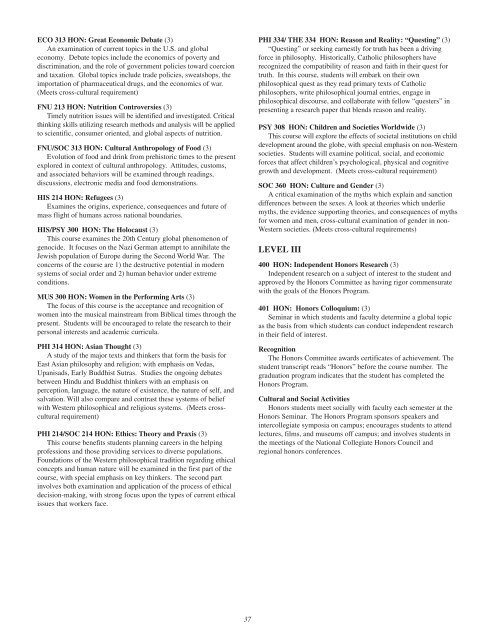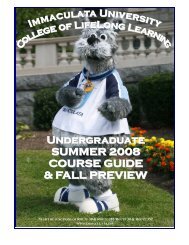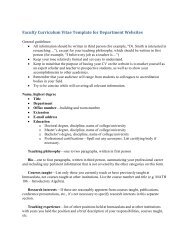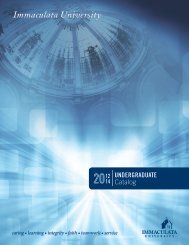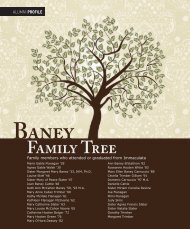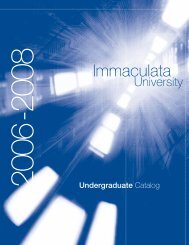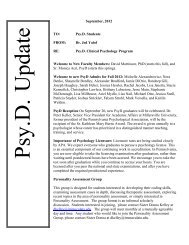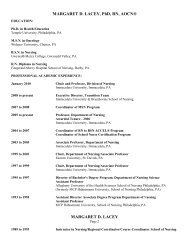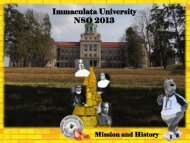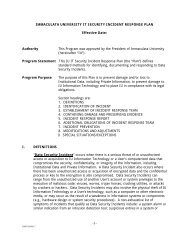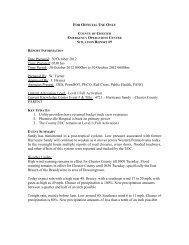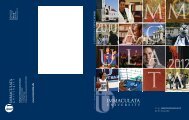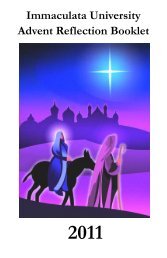Undergraduate Catalog 2008-2010 - Immaculata University
Undergraduate Catalog 2008-2010 - Immaculata University
Undergraduate Catalog 2008-2010 - Immaculata University
Create successful ePaper yourself
Turn your PDF publications into a flip-book with our unique Google optimized e-Paper software.
ECO 313 HON: Great Economic Debate (3)<br />
An examination of current topics in the U.S. and global<br />
economy. Debate topics include the economics of poverty and<br />
discrimination, and the role of government policies toward coercion<br />
and taxation. Global topics include trade policies, sweatshops, the<br />
importation of pharmaceutical drugs, and the economics of war.<br />
(Meets cross-cultural requirement)<br />
FNU 213 HON: Nutrition Controversies (3)<br />
Timely nutrition issues will be identified and investigated. Critical<br />
thinking skills utilizing research methods and analysis will be applied<br />
to scientific, consumer oriented, and global aspects of nutrition.<br />
FNU/SOC 313 HON: Cultural Anthropology of Food (3)<br />
Evolution of food and drink from prehistoric times to the present<br />
explored in context of cultural anthropology. Attitudes, customs,<br />
and associated behaviors will be examined through readings,<br />
discussions, electronic media and food demonstrations.<br />
HIS 214 HON: Refugees (3)<br />
Examines the origins, experience, consequences and future of<br />
mass flight of humans across national boundaries.<br />
HIS/PSY 300 HON: The Holocaust (3)<br />
This course examines the 20th Century global phenomenon of<br />
genocide. It focuses on the Nazi German attempt to annihilate the<br />
Jewish population of Europe during the Second World War. The<br />
concerns of the course are 1) the destructive potential in modern<br />
systems of social order and 2) human behavior under extreme<br />
conditions.<br />
MUS 300 HON: Women in the Performing Arts (3)<br />
The focus of this course is the acceptance and recognition of<br />
women into the musical mainstream from Biblical times through the<br />
present. Students will be encouraged to relate the research to their<br />
personal interests and academic curricula.<br />
PHI 314 HON: Asian Thought (3)<br />
A study of the major texts and thinkers that form the basis for<br />
East Asian philosophy and religion; with emphasis on Vedas,<br />
Upanisads, Early Buddhist Sutras. Studies the ongoing debates<br />
between Hindu and Buddhist thinkers with an emphasis on<br />
perception, language, the nature of existence, the nature of self, and<br />
salvation. Will also compare and contrast these systems of belief<br />
with Western philosophical and religious systems. (Meets crosscultural<br />
requirement)<br />
PHI 214/SOC 214 HON: Ethics: Theory and Praxis (3)<br />
This course benefits students planning careers in the helping<br />
professions and those providing services to diverse populations.<br />
Foundations of the Western philosophical tradition regarding ethical<br />
concepts and human nature will be examined in the first part of the<br />
course, with special emphasis on key thinkers. The second part<br />
involves both examination and application of the process of ethical<br />
decision-making, with strong focus upon the types of current ethical<br />
issues that workers face.<br />
PHI 334/ THE 334 HON: Reason and Reality: “Questing” (3)<br />
“Questing” or seeking earnestly for truth has been a driving<br />
force in philosophy. Historically, Catholic philosophers have<br />
recognized the compatibility of reason and faith in their quest for<br />
truth. In this course, students will embark on their own<br />
philosophical quest as they read primary texts of Catholic<br />
philosophers, write philosophical journal entries, engage in<br />
philosophical discourse, and collaborate with fellow “questers” in<br />
presenting a research paper that blends reason and reality.<br />
PSY 308 HON: Children and Societies Worldwide (3)<br />
This course will explore the effects of societal institutions on child<br />
development around the globe, with special emphasis on non-Western<br />
societies. Students will examine political, social, and economic<br />
forces that affect children’s psychological, physical and cognitive<br />
growth and development. (Meets cross-cultural requirement)<br />
SOC 360 HON: Culture and Gender (3)<br />
A critical examination of the myths which explain and sanction<br />
differences between the sexes. A look at theories which underlie<br />
myths, the evidence supporting theories, and consequences of myths<br />
for women and men, cross-cultural examination of gender in non-<br />
Western societies. (Meets cross-cultural requirements)<br />
LEVEL III<br />
400 HON: Independent Honors Research (3)<br />
Independent research on a subject of interest to the student and<br />
approved by the Honors Committee as having rigor commensurate<br />
with the goals of the Honors Program.<br />
401 HON: Honors Colloquium: (3)<br />
Seminar in which students and faculty determine a global topic<br />
as the basis from which students can conduct independent research<br />
in their field of interest.<br />
Recognition<br />
The Honors Committee awards certificates of achievement. The<br />
student transcript reads “Honors” before the course number. The<br />
graduation program indicates that the student has completed the<br />
Honors Program.<br />
Cultural and Social Activities<br />
Honors students meet socially with faculty each semester at the<br />
Honors Seminar. The Honors Program sponsors speakers and<br />
intercollegiate symposia on campus; encourages students to attend<br />
lectures, films, and museums off campus; and involves students in<br />
the meetings of the National Collegiate Honors Council and<br />
regional honors conferences.<br />
37


